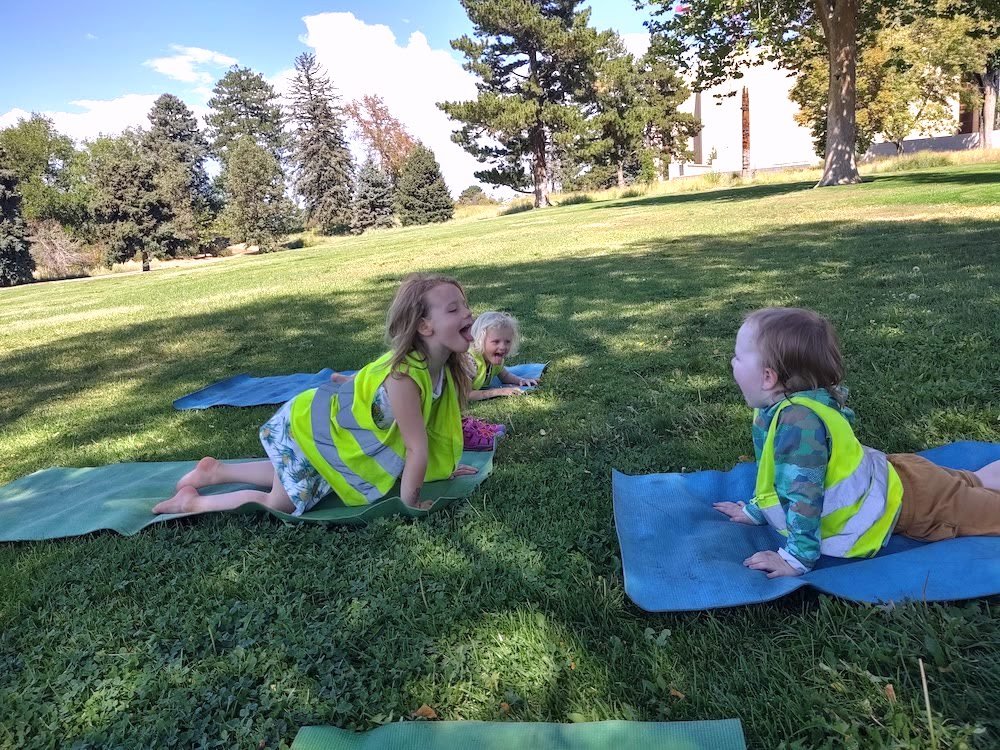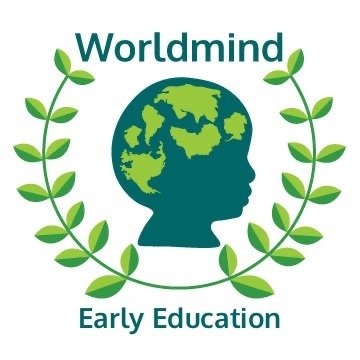Worldmind Early Education
The first licensed outdoor-based preschool & kindergarten in Colorado. Part of UPK.

At a Glance
Outdoor-based school for preschool & kindergarten
Part of UPK
Focus on social and emotional development
Learning in nature and at the Denver Museum of Nature and Science
Small class sizes (5:1 student to teacher ratio)
Multi-age classrooms
STEM + Art/Design curriculum
Real-world learning
Enrollment begins at age 3; all students must be potty trained.
Support available for students with ADHD, autism, dyslexia, anxiety, and/or giftedness
The Importance of Social & Emotional Learning with Dr. Ali Hill
Learn about why Worldmind puts social and emotional learning at the foundation of the school and how it strengthens all learning opportunities in the classroom.
Worldmind creates inclusive spaces for children and their families. We build communities where members feel safe, respected, and valued, and ignite in them a greater love and appreciation for themselves and others.
Our Curriculum
Real-World Learning
Worldmind incorporates an even balance of head (academic achievement), heart (character-building and well-being), and hand (problem-solving, creating, and idea development). This is accomplished through a carefully crafted curriculum that incorporates Real-World Learning. Real-World Learning lends itself to place-based and project-based approaches to pedagogy.
Real-World Learning also incorporates civic education. Through this innovative type of education, teachers can encourage students to see not only their home and school, but also the city and surrounding areas in which they are located, as a real world classroom. Teachers will assign projects that help students to map and engage with real world issues and initiatives in the community. This will be accomplished through multiple field trips throughout the school year. Field trips bring people together in ways that go beyond traditional classroom experiences.
Emergent Curriculum
An emergent curriculum focuses on the process of learning that emerges from the children. It is designed to be open-ended and self-directed in order to meet the needs and interests of every student. It relies on teacher initiative and students’ intrinsic motivation. The components of an emergent curriculum are: students’ interests, teachers’ and accompanied adults’ interests, developmental tasks, things in the physical environment, people in the social environment, curriculum resource materials, unexpected events, living together, conflict resolution and routines, values help in the school and community, family, and culture.
Ecological Consciousness
The Worldmind curriculum connects children to the dynamic ecological systems in Colorado through a series of season-based units that prescribe carefully crafted learning experiences. This pedagogy helps students address past, present, and future ecological issues, and enhances their understanding of an interconnected ecological system. Our curriculum is research-based and provides developmentally appropriate activities in nature so that students can master and integrate ecological consciousness into their lives.
Literacy
Vocabulary is a key component of reading and writing development. Studies have shown that free play in nature can significantly enhance children’s vocabulary development. We have a story time daily, and children practice writing and drawing in their nature journals. Nature journaling helps children stimulate curiosity about the world around them and develop a sense of place and their role in that place. This practice involves stopping and watching how something works and recording it through writing, drawing and collecting. We use nature journals daily to help students record their observations, perceptions, and feelings about the natural world around them.
Mindfulness & Yoga
Worldmind believes that learning about your mind and body and the connection between them is an important part of school. We practice mindfulness — the practice of nurturing a focused awareness on the present — through a series of exercises every morning and encourage students to use it as needed throughout the day. Mindfulness is a growing practice that has been shown to help reduce stress, improve sleep quality, and heighten focus. Incorporated with our mindfulness approach, students are exposed to the practice of yoga at their developmentally appropriate level. Children are able to explore using their bodies in new ways to develop strength, flexibility, and coordination.
Nature Play
Nature play permeates everything we do at Worldmind. For neurodiverse and neurotypical students alike, unstructured outdoor play with other children has proven, time and time again, to be the best thing we can do to support our students. This type of play helps children learn to: regulate their bodies and emotions, plan and coordinate, advocate for their wants and needs, exercise gross and fine motor muscles, practice conflict resolution, embrace creativity and problem solving, work within a group, find what feels good, and more!
Kindergarten Curriculum
Our kindergarten class follows preschool curriculum, with a few modifications:
Literacy
In Kindergarten, the emergent understanding achieved in preschool is applied across different mediums. Teachers foster a deep love for oral stories and the written word through read-alouds, communal storytelling, word plays, rhyming, and chapter books. Phonetic and phonemic awareness is developed through play-based activities inspired by the Orton-Gillingham Approach, which allows for a multisensory experience of learning the English language. This unique combination of learning harnesses the inherent desire that children have to understand the world around them and applies it to the written and spoken word.
Math
A variety of techniques are used to develop essential skills in mathematics. For example, students may be counting dandelions, making base-10 blocks with chalk on the sidewalk, making shapes with sticks, graphing how many birds they see in a day, collecting data on what sinks or floats, or practicing math operations in nature journals. Each student is met where they are and brought along in a communal, supportive manner that makes math fun and part of everyday life.
Forest School
Forest School is a unique learning philosophy that offers people of all ages the opportunity to learn personal, social, technical, academic and environmental skills in a natural environment. This part of our curriculum combines environmental education with forest school skills which include: fire skills, forest tools (using a variety of different tools to create with wood), nature art and design, and shelter building. These activities and skills are integrated throughout the day as teachers and children devise ways to accomplish their goals together. This co-creation is at the heart of the Forest School approach.
Our Classroom
City Park
Views of the mountains and Denver skyline greet our classes daily at our flagship location. Nestled in the park around the historic Denver Museum of Nature & Science (which also serves as a shelter for inclement weather and emergencies), students have ample space to run, jump, climb, and explore. Classes enjoy hiking to the lakes to look for birds, visiting museum exhibits, exploring the Denver Zoo, walking to the Park Hill Library to check out books, and more.
The park and museum’s collaborative Nature Play Area is now open and has enriched our students’ educational experiences through hands-on, nature-based learning. Come explore Denver’s most centrally located nature school experience!
Enrollment
Enrollment Process for Worldmind Preschool and Kindergarten
Call us with any questions before scheduling a tour: 303.276.5690
Schedule a tour and parent interview here to see if your family would be a good fit for Worldmind. If a good fit, you will be invited to apply.
Fill out online enrollment application. There is a $75 application fee.
An acceptance letter and tuition contract will be sent via email.
Sign and return contract.
Pay a non-refundable deposit of $1,000. This deposit will be applied to the tuition balance.
Students must be 3 years old to attend Worldmind Early Ed; all students must be potty trained.
Please find more information on the Enrollment Process on our FAQ page.
Information below reflects classes and tuition rates for the 2025-2026 school year.
There is a 10% tuition discount for siblings.
“We are over a month into the school year and the improvements I’ve seen in my child’s mood in his speech and cognitive functioning are profound. He loves going, he loves his teachers and he’s always so excited to tell me about his day. And not once has he been in a bad mood at the end of his school day. I’m so thrilled for such a program to exist here in Colorado and feel very fortunate to have my child be a part of it.” - Worldmind parent
Tuition
Application Fee: $75
Tuition Deposit: $1,000
We offer the following tuition payment plans:
One Payment – The tuition deposit is deducted from the total tuition and the balance is due August 5th, or on the first day of the month in which the student begins attending Worldmind, at a prorated rate. Payment methods include credit card with a 3% transaction fee, ACH transfer or check with no transaction fees.
Two Payments – The tuition deposit is deducted from the total tuition and the balance is divided into two equal payments due August 5th, and November 5th, or beginning on the first day of the month in which the student begins attending Worldmind and on the first day of a subsequent month to be determined by Worldmind. Payment methods include credit card with a 3% transaction fee, ACH transfer or check with no transaction fees.
Ten Payments – The tuition deposit is deducted from the total tuition, a service charge of $10 per month is added, and the balance is divided into ten equal payments, or beginning on the first day of the month in which the student begins attending Worldmind. Tuition payments are due the first day of every month, starting August 1, 2025, and ending May 1, 2026.
Deposits – A non-refundable deposit of $1,000 per student is due upon acceptance into the school. This deposit will be applied to the tuition balance.
Tuition Discount – There is a 10% discount for siblings.












